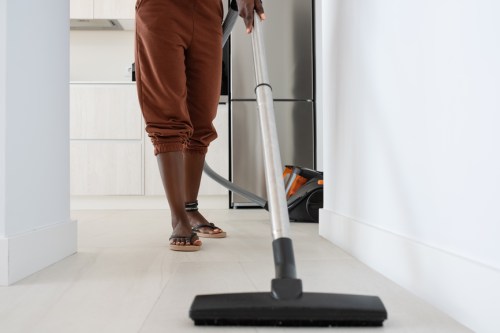Here’s the No. 1 Cleaning Mistake an Allergist and Professional Cleaner See People Make During Allergy Season
If you have ever wondered about the best cleaning for allergy season strategies, make sure you'e doing it right and often.

If you’ve seen The Devil Wears Prada, you know the scene where the entire office is buzzing in preparation for Miranda Priestly (Meryl Streep) to arrive, sunglasses and ice-cold demeanor in tow. Right now, as the last dregs of winter recede, our collective sinuses are basically doing the same thing: The pollen makes you shake in your boots, the ragweed has your eyes watering, and any gust of wind can make you sneeze like crazy.
Experts in This Article
Okay, all silly analogies aside, experts say this allergy season is poised to be even worse than the past few years. It can seem like there isn’t a ton you can do before allergy season except to stockpile tissues and your go-to antihistamine. But there are some ways you can prep your home to protect yourself as much as possible.
What’s the biggest cleaning mistake people make during allergy season?
Dust mites, mold, and animal dander are some of the most common allergens in our homes. But when it comes to spring allergy season, tree pollen and ragweed are the main ones we’re gonna want to watch out for. So when we’re cleaning for allergy season, the two goals are 1) to prevent outdoor allergens from coming inside and 2) to clear the indoor allergens that tend to build up.
Cleaning and allergy experts alike say the biggest mistake that people make is simply not cleaning frequently enough. The term “spring cleaning” can obfuscate our perception of how often we should clean those hard-to-reach nooks and crannies.
“Rugs and carpet need to be vacuumed twice per week, bedsheets washed in hot water once per week, air filters changed every six months, heat/AC vents cleaned one to two times per year, and mopping/dusting once per week,” says Purvi Parikh, MD, adult and pediatric allergist and immunologist at Allergy & Asthma Network. (Though keep in mind that frequency might need to increase if you have pets.)
The truth it, most of us don’t realize how many allergens can accumulate in our homes. One thing we often forget about is our outdoor clothing: If we’re coming in from outside, then sitting on the couch or lying in bed, those surfaces can pick up the outdoor allergens we brought inside on our clothes.
Another mistake that Dr. Parikh sees often is cleaning without a mask. That’s right: Masks aren’t just great for preventing COVID-19; they can also help us avoid respiratory threats from allergens. “I often see people go into allergic reactions or asthma attacks after cleaning due to increased exposure to allergens,” says Dr. Parikh.
What are the best ways to clean for allergy season?
Laura Avila, a professional cleaner of several years at Cleaningfan.com, stresses that it’s essential to use the correct cleaning technique for each unique area of your home. There are a lot of cleaning products out there, and a lot of it comes down to personal preference. However, where allergies are concerned, sometimes science can be helpful. Some of Avila’s top suggestions include:
- Dusting surfaces with a damp cloth or microfiber fabric to effectively remove dust and pet dander.
- Vacuuming carpets and upholstery using a vacuum cleaner with a HEPA filter to help remove dust mites and pet hair.
- Removing mold and mildew using a solution of bleach and water or a specialized mold and mildew remover.
Avila also recommends using a home air quality monitor if you’re having symptoms that you just can’t get under control. Also, even though having the windows open for fresh air is nice, remember to check the pollen rates on your local weather channel before throwing them wide open.
Sign Up for Our Daily Newsletter
Get all the latest in wellness, trends, food, fitness, beauty, and more delivered right to your inbox.
Got it, you've been added to our email list.










